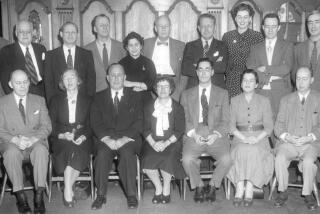BOOK REVIEW / NONFICTION : A Revealing Portrait of a Forgotten Icon : JOE ALSOP’S COLD WAR: A Study of Journalistic Influence and Intrigue, <i> by Edwin M. Yoder Jr.</i> , University of North Carolina Press, $24.95, 220 pages
- Share via
No one ever called him a “spin doctor,” but newspaper columnist Joseph Alsop was an early and expert practitioner of insider journalism, an authentic American aristocrat whose “tribal” connections allowed him to play a crucial role in not only reporting on but also defining the politics of the Cold War era.
“The Alsops had an aura of ‘influence,’ ” writes Edwin M. Yoder Jr. in “Joe Alsop’s Cold War.” “(They) believed that it was their function to be brokers of vital information, reported at a high level of sophistication.”
Joe Alsop and his younger brother, Stewart, wrote a closely read column of political analysis during the hottest years of the Cold War, an era that Yoder calls “a golden age for the Washington column.”
As much as any of their fellow columnists, the Alsops were read and heeded in the places where life-and-death decisions of public policy were actually made.
Yoder, a columnist for the Washington Post and a journalism professor at Washington and Lee University, declares his goal in writing “Joe Alsop’s Cold War” to be “history with a biographical flavor,” but his slender book is best approached as an appreciation of a once-influential but now mostly overlooked figure of American journalism.
Alsop was “somewhat toplofty,” as Yoder readily concedes, a devoted collector of rare antiques, a patrician who favored British tailoring in his closet and the rich and powerful at his table.
The emblematic Alsop story, as retold by Yoder, is that a dutiful John F. Kennedy dropped by Alsop’s Georgetown home for a bowl of soup (and, we presume, some avuncular advice on statecraft) on the night of his presidential inauguration.
“If we indulged in the luxury of more Joe Alsops,” writes Yoder, quoting columnist James Reston, “the melting pot, which has rarely melted as advertised, would hardly have melted at all.”
More to the point of “Joe Alsop’s Cold War,” however, is the role that the Alsops played in defining the agenda of American politics and foreign policy in the 1950s and ‘60s, a subject that Yoder treats with admirable discernment and in illuminating detail.
The Alsops were militant anti-Communists and red-hot cold warriors.
Joe Alsop’s piece for the Saturday Evening Post on “How We Lost China,” for instance, helped frame one of the litmus-test obsessions of the McCarthy era; and the so-called “missile gap” that figured so importantly in Kennedy’s presidential campaign was first conjured up in Joe Alsop’s columns.
At the same time, the genteel Alsops were put off by the worst excesses of Cold War paranoia, including the stalking of J. Robert Oppenheimer (whom they likened to Alfred Dreyfus) and the even more ruthless predations of the McCarthy era.
And Yoder allows us to understand that it was precisely the gentility of the Alsops that set them against a rude beast like Joseph McCarthy himself.
“Even if the Alsops had agreed with McCarthy about the nature of the Communist threat, they differed in almost every other respect,” Yoder explains.
“They had been taught to think of government as a profession for gentlemen, with complex unwritten rules. McCarthy repeatedly proved himself to be a political bruiser who acknowledged no known rule book.”
To his credit, Yoder is willing to call the Alsops to account for their role in stoking the flames of McCarthyism by sounding the alarm over the Red Menace that ignited it in the first place.
“Did the two aspects of the Alsops’ reporting and advocacy--the noisy tocsin-ringing regarding the world threat, the gallant defense of political civility and civil liberties at home--work at cross-purposes?” Yoder asks. “Were they fighting a fire that they themselves had helped to set?”
More often, though, Yoder prefers to concern himself with endearing and sometimes ironic glimpses of Alsop’s life and work.
Alsop is remembered “as Washington’s stoutest--some thought bitterest--advocate of the U.S. war in Vietnam,” Yoder observes, but Alsop was equally passionate on the subject of gardening.
“Watching the new green cover a box bush,” Alsop once wrote, “is just as exciting as watching the progress of the anti-guerrilla effort in South Vietnam.”
Yoder approaches his subject with unmistakable affection and a certain deference.
He mentions in passing that Alsop was a deeply closeted gay man, but seems far more interested in Alsop’s taste in clothing than his sexual orientation.
If “Joe Alsop’s Cold War” sets out to be a gloss on recent American history, the book ends up as a sentimental portrait of “a prickly and ornate relic of a more individualistic past, a true eccentric.”
More to Read
Sign up for our Book Club newsletter
Get the latest news, events and more from the Los Angeles Times Book Club, and help us get L.A. reading and talking.
You may occasionally receive promotional content from the Los Angeles Times.









